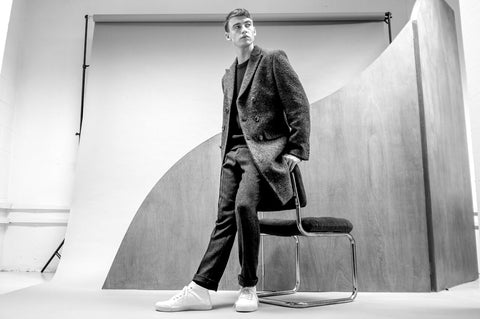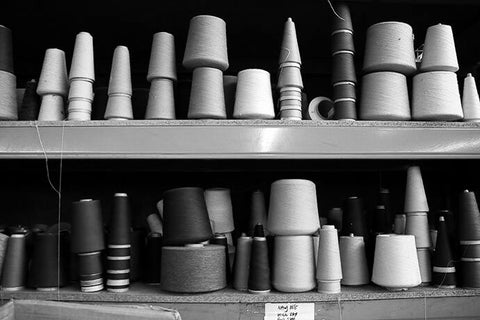Stylish Sustainability // Far Afield
July 30, 2019 – Mercantile London

Responsible practise is at the heart of many discussions surrounding the industry at the moment – one of the brands that faithfully uphold the principles of sustainability and ethical production is Far Afield. Read on to find out how those pieces arrive in your wardrobe and the impact a social conscious can have on believing that change is possible, improving the lives of others and the impact on the world.
THE BEGINNINGS:
Far Afield was founded in the UK by brothers, Mark & Chris Scholes in 2016. Together they have twelve years’ experience in menswear design, production, sourcing and retail. With their acquired skills across the menswear industry, they decided to combine forces back in 2014, and Far Afield is the result of that.


THE ETHOS:
Far Afield makes a conscious approach to sourcing products from reliable and ethically sound suppliers. All clothing and accessories are sourced globally, with a dedication to high quality and ethics.
THE INSPIRATION:
Far Afield is heavily influenced by global travel – it is the colours, textures, sights and experiences that form their ideas. Be it a rainy city in England, or a tropical setting in a faraway land, they take these experiences and combine them with a passion for design.
In order to go further Far Afield are dedicated to sustainable sourcing. They take time when choosing suppliers, always visiting and building a relationship before they agree to do any production. They have built honest and trustworthy relationships with their suppliers over the years, so they know exactly who makes them and the conditions they are made under.


HOW THE CLOTHES ARE MADE:
When looking at a new supplier the brands concerns are; ethical production, adult only labour, fair working conditions and practices, adequate social care for workers and fair remuneration. They require industry standard accreditation and audits where available and insist on practices which go further than fair trade.
Far Afield source their fabrics and yarns from various leading fabric mills across the globe. From SS20 onwards their purchasing policy on new woven and jersey fabrics will involve using Better Cotton Initiative (BCI) accredited cotton only*. The knitwear yarns are purchased from Turkey and Italy and follow all ISO and EKOTEKS standards. Where possible Far Afield purchase BCI cotton yarn, where appropriate they also use recycled polyesters and organic cottons. All buttons are strictly all non-plastic and have been since we launched. We use natural only buttons, including; mother of pearl, shell, coconut and wood. Purchasing ‘dead stock’ fabrics from mills where they have over produced quantities that would otherwise be wasted, also goes some way to their ‘up cycling’ aim.
Far Afield are currently phasing out all non-recyclable plastics in their packaging, and aim to be fully recyclable or non-plastic by SS20. That means no non-recycled plastic bags, plastic clips, collar straighteners, plastic swing tags, and plastic labels. The brand substitute with wood, cardboard or metal and try to strike a balance between crisp, non-crease presentation and heavy over packaging. 

WHERE THE CLOTHES ARE MADE:
Far Afield have very close ties to Sri Lanka due to co-founder Mark having lived in the country for eight years. All factories that are used are known on a personal level and the brand has worked with them in one guise or another for ten years or more. In addition, they directly employ a small team of workers at their office in Colombo who are responsible for their bespoke shirt service, sampling, and factory/mill quality control visits.
All the factories and mills Far Afield use have the necessary accreditations (SEDEX and Sri Lanka Apparel Association) to export garments/manufacture fabrics, and all abide by Sri Lanka — the SL governments strict exportation and employment guidelines.


When it comes to woven fabrics, India is the brands go-to. They work with a variety of mills that are all based mainly within the south of the country, in and around Chennai. To help streamline and keep an eye on the process the company work with a well-respected fabric agent, who deals with quality control and checks. All mills are working to the required governmental standards, and they only source fabrics that adhere to the BCI principles. Where Government standards are not available Fae Afield require internationally accepted standards to be applied.
Turkey is used for the brands knitwear production, where they work with a family run enterprise where it is a second generation of women who run the factory. A friendly and international team now exports globally and they are proud of their quality, and obedience to BSCI standards. Conditions of employment go beyond the legal minimums and all staff enjoy freshly cooked meals each day as well as pension and holiday entitlements – this is reflected in the average ten year tenure. Their yarns, fabrics and trims all have OEKO-TEX certification and mainly come from Italy


As a brand Far Afield are conscious of the carbon footprint of the fashion process, so avoid use of airfreight as much as possible. They have a logistics process which streamlines deliveries to ensure maximum efficiency, including use of recycled cardboard and maximum load densities to get the most efficient haulage time and frequency – cutting down on wastage and empty consignment space. They use sea transport with cargo vessels which abide by the highest standards of pollution reduction and best industry practice.


WHAT ELSE THEY DO TO SHOW THEY CARE:
In addition to excellent working practises Far Afield take part in specific projects and causes when they feel they can assist materially or by helping focus attention. Past endeavours include: donating excess stock to the Good Life Orphanage in Africa, raising funds for the We love MCR charity by producing collaboration products on their AW18 collection, and diverting % of sales into the Manchester Red Cross appeal for the victims of terror attacks. Donating 50% of sales of their ‘Pride’ Logo T-shirt to The Rainbow Fund; a Brighton & Hove based grant-giving fund for local LGBT and HIV/AIDS organisations and also working with local universities to give work experience and projects to young designers and students of marketing.
Shop Far Afield here.
Follow Far Afield here.
